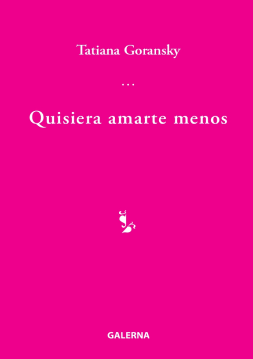TO LOVE YOU LESS


Goransky makes the most of the choral novel to offer readers every facet of drama: passion, desire, lust, madness, failure. The result is a stupendous novella, under the tight surface of which she portrays a true mass of human misery.
Revista Kundra
Every time I read a book by Tatiana Goransky, I am amazed by her sense of rhythm, her ability to maintain the narrative with skill and craft. In just over a hundred pages, she builds a story about love and its complex variations, creating a unique universe of characters filled with frustration, tired of their destiny and dark in nature.
Fondo de Lectura, Spain
The texture of Goransky’s narrative transports us to a cruel, intense, and extremely sharp world in which all the literary machinery is set in motion for the reader to find, in these voices, an echo: perhaps that of society, perhaps that of the inner world of many women, partners, and lovers.
Somos Berlín, Germany
SYNOPSIS
Behind desire, a body; behind the body, a story. Behind love, sometimes, hate. Is there a force more powerful than desire? Julia, Clara, Juan, la Turca, Vera and Ricardo tell their own stories and in doing so tell those of others. Six characters entangled in a polyphonic, violent, loving, sexual plot. With acid humor and irreverence, Tatiana Goransky builds a brutal and polemic novel that breaks with any stereotype about sexuality and shows how easily that territory of pleasure that is the body can become a battlefield.
